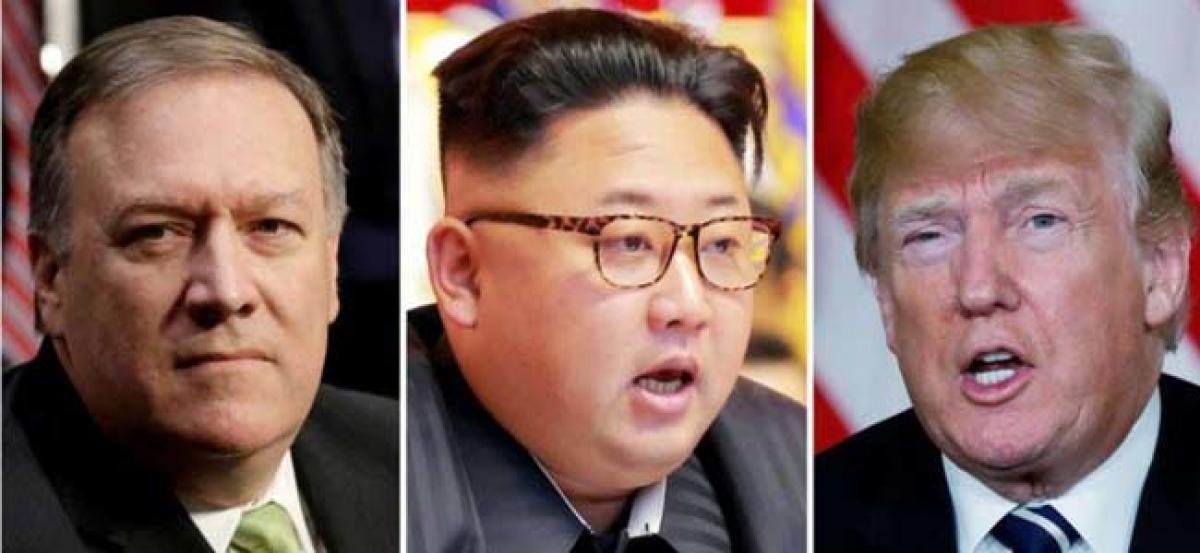Live
- Search intensified for Gowtham Reddy as HC dismisses his bail plea
- Santosh Trophy final round to begin in Hyderabad tomorrow
- BGT: Rohit must return to opening for Brisbane Test, says Ponting
- Swimming sensation Havya steals the show
- NDTL gets WADA nod to manage Athlete Biological Passport
- BWF World Tour Finals: Treesa-Gayatri wins 2nd match to keep semis hopes alive
- Youngest ever to conquer chess world
- Jamie Lever to star in Lakshmi R Iyer’s ‘2050’: It challenged me emotionally
- Prateeksha Srivastava says she seldom meets fellow music composers Rusha, Blizza, in person
- Bridal fitness tips by Yasmin Karachiwala
Just In

America\'s top diplomat Mike Pompeo held meetings with senior North Korean officials in Pyongyang on Wednesday, with speculation swirling around the fate of three US detainees ahead of a planned US-North Korea summit.
America's top diplomat Mike Pompeo held meetings with senior North Korean officials in Pyongyang on Wednesday, with speculation swirling around the fate of three US detainees ahead of a planned US-North Korea summit.
Pompeo was dispatched on an unannounced visit - his second in weeks, but first as secretary of state - to advance preparations for Donald Trump's unprecedented meeting with Kim Jong Un over North Korea's nuclear arsenal.
He told reporters that he hoped to agree a date and venue for the summit - even though Trump said they had already been chosen.
But optimism over the process was dealt a blow by Trump's pullout from a nuclear deal with Iran yesterday.
Pompeo's visit came with rumours flying over three US citizens being held in the North, fuelled by South Korea where the president's office said they expected the men to be freed.
The trio are a significant domestic political issue in the US and Trump hinted last week of imminent news after sources said they had been relocated.
In previous cases, detainees have been set free into the care of high-profile US visitors, but there was no immediate indication they would be released after Pompeo held talks with Kim Yong Chul, director of the North's United Front department, one of the organisations handling relations with the South.
The US hoped "we can work together to resolve this conflict, take away threats to the world and make your country have all the opportunities your people so richly deserve", Pompeo told him, but added: "There are many challenges along the way."
The rapid detente on the Korean peninsula triggered by the Winter Olympics is a marked contrast from last year, when Kim and Trump traded personal insults and threats of war over the North's nuclear and ballistic missile programmes.
"We think relationships are building with North Korea," Trump said in televised comments from the White House. "We will see how it all works out. Maybe it won't. But it can be a great thing for North Korea, South Korea and the entire world."
But the American president spoke as he yanked the US out of a nuclear deal with Iran, complicating the prospects of persuading Pyongyang to surrender its atomic arsenal.
Trump poured scorn on the "disastrous" 2015 accord, reached after a decade and a half of careful diplomacy by Britain, China, France, Germany, Iran, Russia and past US administrations, describing it as an "embarrassment" to the United States.
Other signatories and the International Atomic Energy Agency say Iran has complied with its obligations under the deal, and Adam Mount of the Federation of American Scientists said: "Amazing to think that Secretary Pompeo will arrive in Pyongyang today bearing the following message: 'If you eliminate your nuclear weapons, we'll lift sanctions and won't attack you. You can trust us'."
The details of any North Korean deal appear to be still under discussion.
At a historic meeting in the Demilitarized Zone last month, Kim and South Korean President Moon Jae-in reaffirmed their commitment to a "common goal" of "complete denuclearisation" of the Korean peninsula in their Panmunjom Declaration.
Yesterday, Kim met Chinese President Xi Jinping in China -- the second time in six weeks - highlighting efforts by the Cold War-era allies to mend frayed ties, and with Beijing keen to avoid being left out in the cold.
China's official Xinhua news agency cited Kim as telling Xi there was no need for North Korea to be a nuclear state "as long as relevant parties abolish their hostile policies and remove security threats against" the country.
Kim also expressed hope that the US and North Korea would take "phased and synchronous measures", signalling Pyongyang wanted a quid pro quo.
Pompeo's itinerary - including whether he would meet the North Korean leader in Pyongyang - was not clear.
He told reporters he would look to prepare for the summit between Trump and "Chairman Un", prompting mockery from observers.
"Pompeo doesn't know the surname is Kim, but he's definitely on top of all the conceptual and semantic nuances associated with the phrase 'denuclearisation of the Korean Peninsula'," arms control specialist Jeffrey Lewis tweeted derisively.
Also today, Japanese Prime Minister Shinzo Abe and Chinese Premier Li Keqiang backed the Panmunjom Declaration at a tripartite summit with Moon in Tokyo, Seoul said.
But the three neighbours have differing positions on the North, with Japan taking by far the hardest line but finding itself largely watching the diplomatic frenzy from the sidelines, left uneasy by the pace of events and by what it sees as an unwarranted softening towards an untrustworthy Pyongyang.
The North should not be given a reward for closing its nuclear test site or not launching long-range missiles, Abe said after talks with Moon, according to the Blue House.
"The North should take additional and concrete actions," it cited him as saying.

© 2024 Hyderabad Media House Limited/The Hans India. All rights reserved. Powered by hocalwire.com







